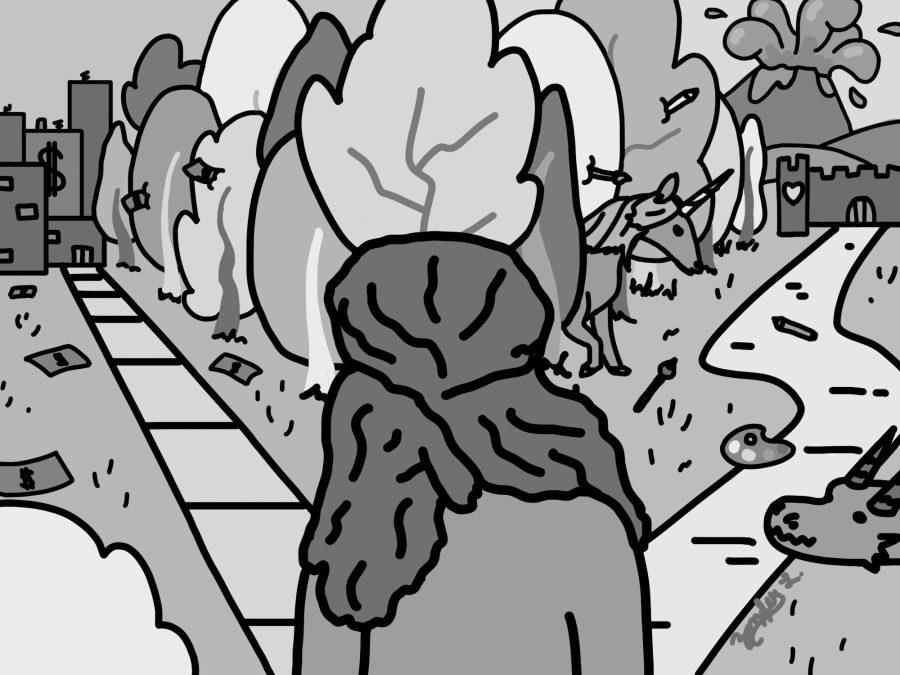Macbeth.” “1984.” “Lord of the Flies.” “Of Mice and Men.” “Romeo and Juliet.” In ninth and tenth grades at Paly, teachers introduce most of these classics to their students.
However, although English teachers give lessons on generally the same literature, their teaching methods vary greatly. While some teachers opt for traditional reading, answering close-reading questions followed by writing an essay on the book’s theme, others encourage students to engage with the literature through more interactive methods, from watching related films to acting out passages, or even committing what many teachers and students consider a crime — using online study guides like SparkNotes.
More English teachers should embrace non-traditional literary analysis and incorporate more interactive in-class activities rather than just teaching through reading and writing. Interactive learning can make reading more engaging and also help students better understand and relate to the central themes of a text.
English 10A and Humanities teacher Mimi Park said that providing students with other resources relevant to the assigned reading can promote stronger connections between a literary work and a student’s own life experiences.
Story continues below advertisement
For example, while having her students read “Bless Me Ultima,” a coming-of-age novel about a young boy who seeks to reconcile his various cultural identities, Park showed her students parts of the film “Fresh Off the Boat,” in which the main character’s Taiwanese family members adjust to their new lives after immigrating to America. Both stories convey a feeling of being an outsider and allow students to observe common themes. By learning that these themes transcended cultures, students could feel more empathy with the characters and make connections with the literature.
Watching film adaptations and different takes and perspectives on novels can help students better understand a book’s content and themes, especially if the language is difficult to comprehend. English 10A and Social Justice Pathway teacher Marc Tolentino said this proved helpful when his students studied “Macbeth.”
In his class, students alternated between reading and watching interpretations of the play, enabling them to better appreciate the text and obtain more meaning from it. If students are able to witness a visual and audio interpretation of what they read, it makes written concepts much more real and tangible.
Although many teachers implement such practices with “Macbeth” or “Romeo and Juliet,” this interactive learning style is helpful beyond Shakespeare, and should also be used more widely.
Alternative learning includes reading reviews or opinions and perspectives on a book, as well as referencing other sources. According to Kindel Launer, who teaches World Literature, AP English Language and English 9A, the literature that students read in class is important work and should be studied in the same way as important concepts in biology or math — by using various texts and interpretations. She even suggests using Shmoop, which offers homework help, teacher resources and test prep similar to Sparknotes, and watching related TED Talks. This can help students understand the basics of the plot more quickly, allowing them to move on to understanding deeper messages sooner. Additionally, after acquiring the basics of the plot, students are often more interested in continuing to read the book.
By teaching students using non-traditional techniques, teachers are trying to help students who may not have enough experiences to connect with texts. Launer said a teacher’s experience is very different from a student’s, and students and teachers are going to value different aspects of literature. While students may not have the history or life experience to immediately connect with the meaning of a piece of literature, using other people’s interpretations of the story, whether in films or reviews, can help fill in the gaps for the students.
More English teachers should use interactive, non-traditional teaching methods in order to provide many learning benefits.
At the least, it will, allow students to find more meaning and connections between the text and their own life experiences. And at its best, it may turn today’s reluctant reader into a lifetime lover of literature.

